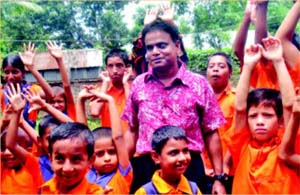Visually-impaired ex-cotton mill worker runs free education centre for children in Tangail
 Rafiqul Bari indeed knows what it means to see nothing. He was born with normal organs, but a slight stomach problem at the age of two changed his life forever. Wrong treatment by a quack made him blind.
Rafiqul Bari indeed knows what it means to see nothing. He was born with normal organs, but a slight stomach problem at the age of two changed his life forever. Wrong treatment by a quack made him blind.
So to ease a little the heavy burden weighing down physically or mentally challenged children in life, he has set up a centre to give them the basic education and vocational training for free.
Founded in 2003 at Ghatail in Tangail, the Welfare Centre for Challenged offers general education up to class-III. The “school” has now 120 students aged between five and 16, 45 of whom are mentally challenged.
Inspired by Rafiqul’s initiative, some local youths joined hands. Of them, Bhajan Chandra Nath took charge as headmaster and Md Mukul, Shamsunnahar Begum, Shiuli Akhter and Razina Akhter as assistant teachers. They also do other work at the centre.
The vocational courses include sewing and boutique training for all the children, 55 of whom are girls.
Thanks to such education, training and care, some of them have overcome their physical and mental barriers.
Ten-year-old mentally challenged Shuvo, for example, has changed in many ways. His mother said he can now respond to and follow instructions. “He can also write,” she said.
Towhid Islam, also 10, has no hands. At the centre, he has mastered the skill of writing with his toes.
The “school” is unique in that it has no steadfast rules for learning, nor is there any rigorous test. It is a care-more-force-less method. However, three examinations are held every year as in other schools, and students are required to pass for promotion to the next class. Most students take two years to complete each grade.
On completion of education at the centre, a number of students got admitted to other schools. A few others now work at different tailoring shops in the area.
Shamsunnahar, a third year student of Ghatail GBG College, teaches Bangla and Social Science at the centre. She said the instructors had no training in teaching physically and mentally impaired children, but they are doing it sincerely.
Asked about his experience in working for these disadvantaged children, Rafiqul said, “Sometimes they are considered a burden on the family and society, but it is not true. They can lead a normal life if they get proper care and some training.”
It pains him that many parents do not treat their challenged kids well. “They [parents] spend a lot of time and money for their ‘normal’ children, but ignore the needs of the challenged ones.”
Initially, six young boys and girls began teaching at the centre without any remuneration. In February this year, three other teachers were appointed. They all now get a little honoraria.
In the beginning, arranging money was his main challenge. So he started a microcredit programme to maintain costs. The Ghatail cantonment authorities came forward to provide a second-hand microbus and Tk 1 lakh. Things eased further for him when local political, social and business leaders extended support to his cause.
In 2005, the then deputy commissioner of Tangail allotted a piece of land at Chandusi of Ghatail municipality for the setting up of the centre.
“Basically, the centre runs on the income from the microcredit programme and some donations,” Rafiqul told The Daily Star.
BECOMING A TORCHBEARER
Born in 1968 in Baguntali under Tangail upazila, Rafiqul remained at home for much of his childhood. His parents, whom he lost in his 20s, took him to many doctors but no treatment could restore his vision.
In 1983, he undertook a series of training at the National Federation of the Blind, as he wanted to grow into a self-dependent man. He also received a multitude of vocational training.
He joined Tangail Cotton Mills at Mirzapur as a worker in 1989 but lost his job when the company laid off staff in 2002.
It was time for a new beginning, he thought. So he returned home and set up the centre with the money he had saved and got through the golden handshake.
The school section started its journey with 15 students in May the same year.
Rafiqul Bari terms the progress made in the last eight years positive. But his challenges lie ahead. “I want to set up a hostel for the children and arrange training for the teachers,” he said.
As for himself, Rafiqul, still single, lives in a tin-shed room near the centre. He does his own shopping, cooking, washing and everything else.
He can move alone. He has his stick to show him the way.
Courtesy of The Daily Star






